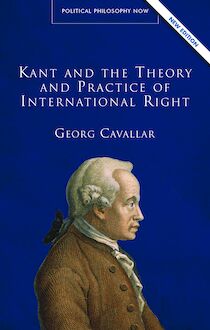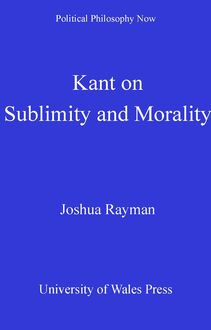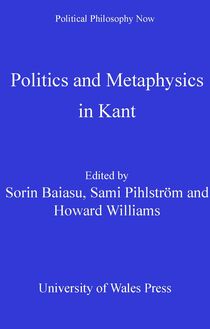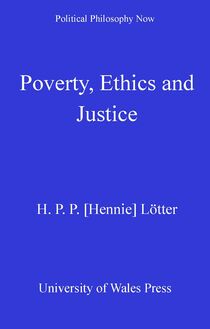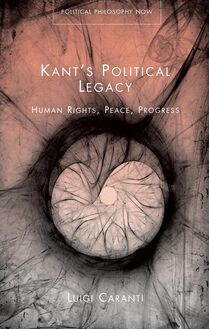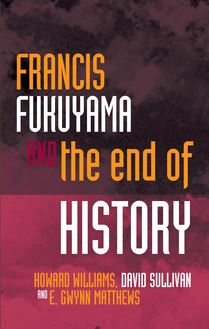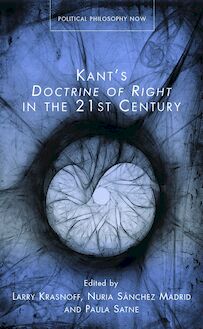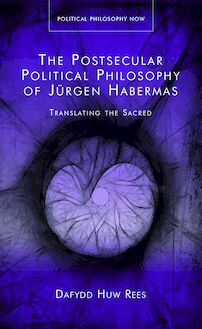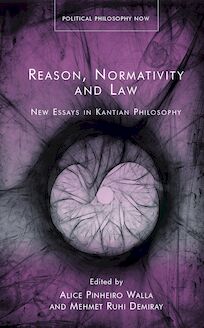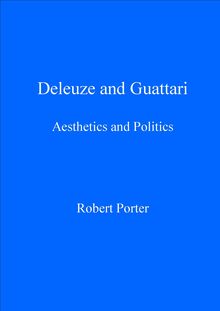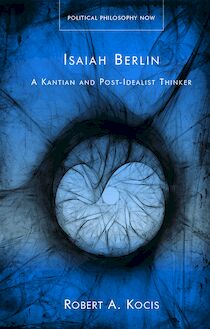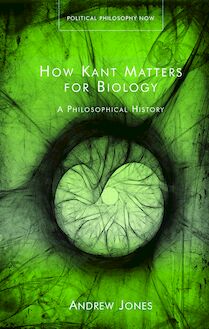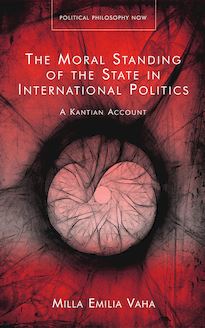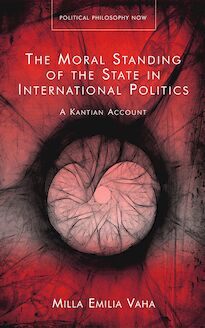-
 Univers
Univers
-
 Ebooks
Ebooks
-
 Livres audio
Livres audio
-
 Presse
Presse
-
 Podcasts
Podcasts
-
 BD
BD
-
 Documents
Documents
-
- Cours
- Révisions
- Ressources pédagogiques
- Sciences de l’éducation
- Manuels scolaires
- Langues
- Travaux de classe
- Annales de BEP
- Etudes supérieures
- Maternelle et primaire
- Fiches de lecture
- Orientation scolaire
- Méthodologie
- Corrigés de devoir
- Annales d’examens et concours
- Annales du bac
- Annales du brevet
- Rapports de stage
La lecture à portée de main
Vous pourrez modifier la taille du texte de cet ouvrage
Découvre YouScribe en t'inscrivant gratuitement
Je m'inscrisDécouvre YouScribe en t'inscrivant gratuitement
Je m'inscrisEn savoir plus
Vous pourrez modifier la taille du texte de cet ouvrage
En savoir plus

Description
Kant denied biology the status of proper science, yet his account of the organism has received much attention from both philosophical and historical perspectives. This book argues that Kant’s influence on biology in the British Isles is in part due to misunderstandings of his philosophy. Highlighting these misunderstandings exposes how Kant influenced various aspects of scientific method, despite the underlying incompatibility between transcendental idealism and scientific naturalism. This book raises criticism against scientific naturalism as it demonstrates how some concepts that are central to biology have been historically justified in ways that are incompatible with naturalism. Approaching current issues in philosophy of biology from a Kantian orientation offers new perspectives to debates including our knowledge of laws of nature, the unity of science, and our understanding of organisms. Moreover, new avenues are forged to demonstrate the benefits of adopting Kant-inspired approaches to issues in contemporary philosophy of science.
Introduction
1. Understanding influence: the role of transcendental idealism for the development of biology
2. Kant’s response to Hume and the status of laws in contemporary philosophy of science
3. Kant’s influence on Whewell
4. Whewell’s influence on Darwin and role of design for the organism
5. Kant’s significance for contemporary philosophy of biology
Conclusion
Endnotes
Bibliography
Sujets
Informations
| Publié par | University of Wales Press |
| Date de parution | 15 mars 2023 |
| Nombre de lectures | 0 |
| EAN13 | 9781786839756 |
| Langue | English |
Informations légales : prix de location à la page 0,4700€. Cette information est donnée uniquement à titre indicatif conformément à la législation en vigueur.
Extrait
POLITICAL PHILOSOPHY NOW
Chief Editor of the Series:
Howard Williams, Aberystwyth University, Wales
Associate Editors:
Wolfgang Kersting, University of Kiel, Germany
Renato Cristi, Wilfrid Laurier University, Waterloo, Canada
Susan Meld Shell, Boston College, Massachusetts, USA
David Boucher, Cardiff University, Wales
Affiliate Editors:
Peter P. Nicholson, formerly of University of York, England
Steven B. Smith, Yale University, USA
Political Philosophy Now is a series which deals with authors, topics and periods in political philosophy from the perspective of their relevance to current debates. The series presents a spread of subjects and points of view from various traditions which include European and New World debates in political philosophy.
Also in series
The Moral Standing of the State in International Politics: A Kantian Account Milla Emilia Vaha
Kant’s Doctrine of Right in the Twenty-first Century Edited by Larry Krasnoff, Nuria Sánchez Madrid and Paula Satne
Hegel and Marx: After the Fall of Communism David MacGregor
Politics and Teleology in Kant Edited by Paul Formosa, Avery Goldman and Tatiana Patrone
Identity, Politics and the Novel: The Aesthetic Moment Ian Fraser
Kant on Sublimity and Morality Joshua Rayman
Politics and Metaphysics in Kant Edited by Sorin Baiasu, Sami Pihlstrom and Howard Williams
Nietzsche and Napoleon: The Dionysian Conspiracy Don Dombowsky
Nietzsche On Theognis of Megara Renato Cristi and Oscar Velásquez
Francis Fukuyama and the end of history Howard Williams, David Sullivan and E. Gwynn Matthews
Kant’s Political Legacy: Human Rights, Peace, Progress Luigi Caranti
POLITICAL PHILOSOPHY NOW
How Kant Matters for Biology
A Philosophical History
Andrew Jones
UNIVERSITY OF WALES PRESS • 2023
© Andrew Jones, 2023
All rights reserved. No part of this book may be reproduced in any material form (including photocopying or storing it in any medium by electronic means and whether or not transiently or incidentally to some other use of this publication) without the written permission of the copyright owner except in accordance with the provisions of the Copyright, Designs and Patents Act. Applications for the copyright owner’s written permission to reproduce any part of this publication should be addressed to the University of Wales Press, University Registry, King Edward VII Avenue, Cardiff CF10 3NS.
www.uwp.co.uk
British Library Cataloguing-in-Publication Data
A catalogue record for this book is available from the British Library.
ISBN 978-1-78683-973-2
eISBN 978-1-78683-975-6
The right of Andrew Jones to be identified as author of this work has been asserted in accordance with sections 77, 78 and 79 of the Copyright, Designs and Patents Act 1988.
The publisher has no responsibility for the persistence or accuracy of URLs for any external or third-party internet websites referred to in this book, and does not guarantee that any content on such websites is, or will remain, accurate or appropriate.
For my parents, Paul, Barbara and Angela
Contents
Acknowledgements
Introduction
1 Understanding Influence: the Role of Transcendental Idealism for the Development of Biology
Introduction
1.1 Transcendental idealism as subservient to the scientifically minded philosopher
1.1.1 The scientifically minded philosopher and the relation between appearances and things in themselves
1.1.2 Strawson’s account of the self
1.1.3 Strawson and the problem of translation, transcendental idealism and transcendental realism
1.2 The role of influence and theory for history and science
1.2.1 Berlin and Kuhn on the relation between history and science
1.2.2 Scientific revolutions and incommensurability
1.3 The context of research programmes and the Lenoir thesis
1.3.1 Lakatos’s conception of research programmes and the Lenoir thesis
1.3.2 Criticisms of the Lenoir thesis
1.4 Expanding the scope of influence
1.4.1 Bloom: influence in poetry
1.4.2 Feyerabend: science as a creative process
1.4.3 Potochnik: idealisation and science
1.4.4 Collingwood: metaphysics as absolute presuppositions
1.4.5 The emerging conception of influence
Conclusion
2 Kant’s Response to Hume and the Status of Laws in Contemporary Philosophy of Science
Introduction
2.1 Kant’s interpretation of Hume
2.1.1 The sources of Kant’s interpretation of Hume
2.1.2 Kant’s misunderstanding of Hume’s relations of ideas and matters of fact
2.2 Interpretations of Hume’s philosophy
2.2.1 The sceptical realist interpretation of Hume
2.2.2 Transcendental idealism as developing from Humean empiricism
2.3 Metaphysical arguments regarding the existence of laws
2.3.1 Bhaskar’s transcendental realism and Cartwright’s nomological pluralism
2.3.2 A mathematical antinomy: Bhaskar and Cartwright
2.3.3 Transcendental arguments in Bhaskar’s and Cartwright’s accounts
Conclusion
3 Kant’s Influence on Whewell
Introduction
3.1 The relationship between Whewell and Kant
3.1.1 The similarities and differences between the philosophies of Kant and Whewell
3.1.2 Whewell’s colligation of facts and the consilience of inductions
3.1.3 Whewell’s theological resolution of the fundamental antithesis
3.2 The status of consilience in contemporary philosophy of biology
3.2.1 Contemporary interpretations of Kant’s philosophy of science
3.2.2 Consilience and reductivism in philosophy of science
Conclusion
4 Whewell’s Influence on Darwin and the Role of Design for the Organism
Introduction
4.1 Whewell’s influence on Darwin’s On the Origin of Species
4.1.1 The role of design in Whewell’s philosophy
4.1.2 The influence of Whewell and Herschel on the arguments of Darwin’s Origin
4.2 Darwin and design: the relation between artificial and natural selection in Darwin’s Origin
4.2.1 The relation between artificial and natural selection
4.2.2 The distinction between organisms and artefacts for Darwin, Paley and Kant
4.3 Organisms and design in contemporary biology
4.3.1 Kant’s account of design and its relation to contemporary philosophy of biology
4.3.2 Organisms without design
Conclusion
5 Kant’s Significance for Contemporary Philosophy of Biology
Introduction
5.1 Definitions of biological individuality in contemporary philosophy of biology
5.2 Natural teleology and biological autonomy
5.2.1 Biological autonomy in contemporary philosophy of biology
5.2.2 The relationship between physical and moral teleology in Kant’s philosophy
5.3 Kantian morality and biological freedom
5.3.1 Dupré’s account of biological freedom
5.3.2 Determinism and the Second Analogy
5.3.3 The role of Kant’s account of freedom for guiding the development of science
Conclusion
Conclusion
Notes
Bibliography
Acknowledgements
This book originated from my PhD research. I thank the AHRC South West and Wales Doctoral Training Partnership for funding that research. I am indebted to Christopher Norris for his support and encouragement as I developed these arguments from their germinal forms. I also thank John Dupré for our invaluable discussions as my second supervisor. Building the foundations of this work under the guidance of two supervisors largely critical and suspicious of the Kantian standpoint was invaluable for this project. I also thank Angela Breitenbach and Jon Webber for their rigorous feedback during my PhD examination.
I owe special thanks to the commitment and rigor of the members of the Kant reading group that we formed at Cardiff University: Howard Williams, Andrew Vincent, John Saunders and Hugh Compston. None of us were prepared for the task we undertook when started our weekly meetings in 2015!
I am honoured that my postdoctoral research fellowship with the Theology and Religion department at the University of Exeter allowed me to develop my ideas into this book. My research, under the exceptional support and guidance of Christopher Southgate, forms part of the project ‘God and the Book of Nature’. This project, funded by the John Templeton Foundation (Grant ID 61507), provided me with the exciting opportunity to extend my scope of research to the relationship between science and theology. Finally, I am especially thankful to the anonymous reviewer for this manuscript, their exceptional feedback was a guiding beacon in the later stages of its development. Any errors in this book are my own and its contents do not necessarily reflect the views of my funders.
Introduction
This is a book about understanding how philosophical ideas have influenced the development of science, with a specific focus on the case study of Immanuel Kant’s influence on the development of biology in the British Isles. The central theme connecting the various arguments of this book is my conviction that re-examining Kant’s historical influence on the development of biology can elucidate some of the predominant disputes in the contemporary philosophy of biology. This by no means entails that Kant is the only historical figure who might offer elucidation on these issues. My aim is to demonstrate how the history of philosophy and the philosophy of science can offer new perspectives on the issues facing contemporary philosophers.
The title of this book, How Kant’s Philosophy Matters for Biology , draws from the structure of Kant’s question in the Critique of Pure Reason – how are synthetic a priori propositions possible?. 1 Kant avoids delving into an enquiry concerning whether these judgements are possible, instead he begins his critical philosophy by asserting the undeniable existence of these judgements. I adopt a similar strategy in this book by focusing on how Kant matters, rather than questioning whether he matters, for biology. I build from previous accounts by philosophers and historians of biology that have focused on the significance of Kant’s philosophy to investigate precisely how philosophers and scientists have deployed aspects of Kant’s phil
-
 Univers
Univers
-
 Ebooks
Ebooks
-
 Livres audio
Livres audio
-
 Presse
Presse
-
 Podcasts
Podcasts
-
 BD
BD
-
 Documents
Documents
-
Jeunesse
-
Littérature
-
Ressources professionnelles
-
Santé et bien-être
-
Savoirs
-
Education
-
Loisirs et hobbies
-
Art, musique et cinéma
-
Actualité et débat de société
-
Jeunesse
-
Littérature
-
Ressources professionnelles
-
Santé et bien-être
-
Savoirs
-
Education
-
Loisirs et hobbies
-
Art, musique et cinéma
-
Actualité et débat de société
-
Actualités
-
Lifestyle
-
Presse jeunesse
-
Presse professionnelle
-
Pratique
-
Presse sportive
-
Presse internationale
-
Culture & Médias
-
Action et Aventures
-
Science-fiction et Fantasy
-
Société
-
Jeunesse
-
Littérature
-
Ressources professionnelles
-
Santé et bien-être
-
Savoirs
-
Education
-
Loisirs et hobbies
-
Art, musique et cinéma
-
Actualité et débat de société
- Cours
- Révisions
- Ressources pédagogiques
- Sciences de l’éducation
- Manuels scolaires
- Langues
- Travaux de classe
- Annales de BEP
- Etudes supérieures
- Maternelle et primaire
- Fiches de lecture
- Orientation scolaire
- Méthodologie
- Corrigés de devoir
- Annales d’examens et concours
- Annales du bac
- Annales du brevet
- Rapports de stage
